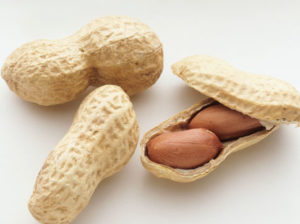 Peanut allergies can be life-altering and life-threatening. But in the past year there have been welcome developments in both preventing peanut allergies and in treatment of peanut allergies in children.
Peanut allergies can be life-altering and life-threatening. But in the past year there have been welcome developments in both preventing peanut allergies and in treatment of peanut allergies in children.
The latest medical advice to prevent peanut allergy is to regularly feed tiny amounts of pureed peanut products to babies before their first birthday. Even as early as the 4th month! This is the total opposite of the old advice for preventing peanut allergies, which was to avoid, avoid, avoid giving peanut products to babies. Oops.
Experts say this method of early introduction, and frequent feeding of small amounts of the food to babies, works best for preventing the development of peanut and egg allergies. [But even with this method, some will eventually develop the food allergies.]
What is a "small amount" of peanuts that should be fed the baby? Guidelines are: "Eight grams of peanut butter (1 heaped teaspoon or 1.5 regular teaspoon) or 17 g of peanut puffs should be consumed at least twice weekly to protect against peanut allergy." However, note that this intervention does not treat peanut allergy. Instead, it is a way to try to prevent a peanut allergy from developing in young children.
But what about older children who already have peanut allergies? What can be done? The US Food and Drug Administration (FDA) recently approved the first ever oral immunotherapy to treat peanut allergies in children between the ages of 4 to 17 years. However, the goal of the therapy is to make children less sensitive and to decrease their allergic reactions. They are still allergic, but less so. For example, after 1 year of treatment - about 2/3 of the kids were able to tolerate 600 mg of peanut protein. Unfortunately, the other third could not.
But here too, continued exposure is important. Researchers found that after 1 year, those who could tolerate the peanut protein have to continue ingesting tiny amounts of peanut. If they stop - the children will lose their tolerance within 2 months.
Treating peanut allergies. From March 2, 2020 article in Medscape: Treating Peanut Allergy With Oral Immunotherapy: Insights From an Insider
Preventing peanut allergies. From August 28, 2019 article in Medscape (the medical site): Pureed Peanuts Advised for Infants to Stave Off Allergy
Feeding pureed peanut products regularly to babies before their first birthday could reduce their risk of developing peanut allergies later on, doctors advise.
In a practice guide for health care providers, a team of pediatricians and allergy specialists encourage introducing peanuts in pureed or powdered form as early as age 4 months for most babies, and making sure the babies continue to get exposure to "substantial" amounts of peanut products in their first years of life.
He added that at-home introduction of peanut products is best suited for infants who do not have eczema, or have only a mild form of the skin disorder.
The hardest part of implementing the current guidelines regarding peanut exposure for babies is that they "are a complete reversal from the prior practice of delaying peanut exposure," said Dr. Ruchi Gupta of the Northwestern University Feinberg School of Medicine in Chicago, a pediatrician and food allergy researcher who wasn't involved in the practice guide.
Because allergic reactions to peanuts can be so dangerous, doctors previously advised parents to avoid giving peanut products to babies. But a 2015 study prompted a rethink of the guidelines, the authors note in CMAJ, online July 22.
The trial included 640 babies younger than 11 months with either egg allergy or eczema - both risk factors for developing peanut allergy. But researchers found that when these high-risk infants were fed a small amount of peanut butter 3 times a week, only 3% went on to develop peanut allergy after 5 years, while 17% of children who avoided peanuts during infancy became allergic.
In the practice guide, a team of pediatricians and allergy specialists recommends introducing peanut protein to babies aged between 4 and 6 months in the form of paste, butter or powdered puff as one of the first foods during the process of weaning off breast milk.
"A lot of people assume that this just means feed it to (babies) once but it is really important that you feed repeatedly and over a longer period of time so that the immune system actually learns to tolerate it," said Gupta's colleague Christopher Warren, also of the Feinberg School of Medicine, who joined her on the phone interview.
Guidelines from the U.S. National Institute of Allergy and Infectious Diseases recommend checking the allergy status of high-risk infants through the skin-prick method or specific immunoglobulin E (IgE) testing before introducing peanuts. The allergy societies of Canada, Australia and the UK don't mandate this test, the authors write.
The method of early introduction has also been tested with other major allergenic foods such as milk, egg, sesame, fish and wheat, but the protective effect of early introduction of these foods in a child's diet was most pronounced in the case of peanuts and eggs, experts noted.

I'm currently on a course of FAHF-2 (chinese herbal formula), from a recommendation from my doctor for dust mite allergies. But it's been shown to be effective for stopping anaphylaxis for peanuts in mice recently, so it may be useful to some people. Here is the study:
https://pubmed.ncbi.nlm.nih.gov/15637565/